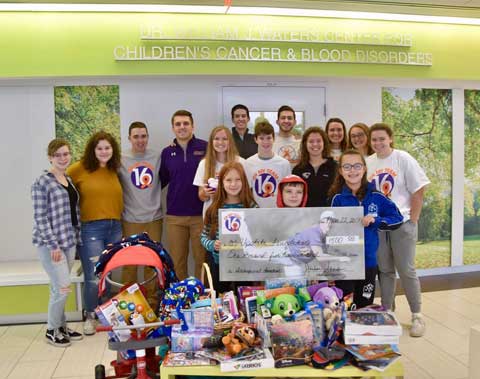No child ever wants to spend any length of time in a hospital surrounded by beeping machines, needles and strangers in white coats. However, this is a reality that too many children have to face. Children diagnosed with cancer or any serious illness have to spend lengthy visits to a hospital. When a hospital serves as a temporary home for children, they can often feel left out from not getting the chance to play with their friends; and scared, from the unfamiliarity of their setting.
In many Canadian children’s hospitals, there are entire departments dedicated to helping these children combat the scary feelings associated with hospital stays. These departments are often called Patient Experience Programs or Child Life programs and focus on ensuring that the child can resume their normal activities like school lessons, reading and playing. The therapeutic play is designed to help children cope with the stress of a potentially new and serious diagnosis, as well as the stress of deviating from their regular routine. A children’s hospital in Toronto, Canada states that “We embrace the value of play in our commitment to children’s health and development” These programs focus solely on patient experience and ensuring that care for each child is individualized, providing them with exactly what they need mentally and physically. Intended to promote positive experiences, trained Child Life Specialists use play to allow children to express their emotions, and allow some normalcy within their hospital care.
These programs are important in both the recovery and overall well-being of a child. By ensuring that every child’s need is met, whether it be through a classroom like a game, a pet therapy session or the opportunity to play with other children, Patient Experience programs are integral parts of Children’s hospitals in Canada.
In Canada, most healthcare services paid for by the government, programs like the ones mentioned above are not added costs to the families. These programs are often funded through provincial governments and donations from the public. The CHEO Foundation is a department within CHEO solely dedicated to fundraising money to support all of the work and research that happens at the CHEO Research Institute. The Children’s Hospital of Eastern Ontario (CHEO) hosts a major fundraiser every year, called the CHEO Telethon, which just raised nearly 11 million dollars this past weekend.
Often times these programs are viewed as extra because they are not imperative to the treatment of a children’s disease; however, they can have hugely positive effects on a child’s recovery. However, in Canada, the programs are essential to the development, recovery, and well-being of children.
Many hospitals in the United States have similar programs designated for pet therapy, playing and learning activities. These programs continue to grow and develop and help children develop while they recover.
The care and support received from these hospitals are, no doubt, amazing. However, On My Team16 wants to be able to provide those “extras” that boost recovery and help enlighten a child’s care. The treatment they receive is the priority but we think that we can help take some stress out of their day to day lives by providing children with more opportunities to engage in play therapy, or have visits with therapy dogs, or see their favourite sports team play. On My Team 16 is a charity that has similar goals in mind for those Child Life programs seen at many Canadian children’s hospitals. With the growing success and impact that On My Team16 has on the hospitals they associate with regularly, there is no doubt that many more hospitals will want to join their team so that they can provide the same benefits that come from Child Life or Patient Experience Teams.
- http://www.sickkids.ca/patient-family-resources/Child-Life/index.html





Leave A Comment